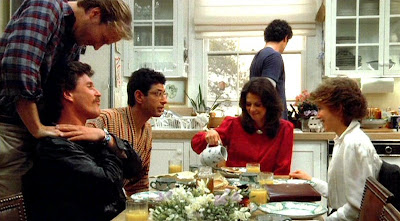 Nobody likes Hitler. We all want to see him dead. This movie depicts the last days of Hitler, hunkered down inside his Berlin bunker. And I have to say it was one of the most gut wrenching cinema experiences I've had in quite some time.
Nobody likes Hitler. We all want to see him dead. This movie depicts the last days of Hitler, hunkered down inside his Berlin bunker. And I have to say it was one of the most gut wrenching cinema experiences I've had in quite some time.Let me be straight, I felt no pity for Hitler, no pity for that monstrosity of a man. Rather I feel extraordinary sympathy with the people caught in his terrible wake. The General who doesn't want his family captured, so he blows them up at dinner with two grenades. The young secretary who was there for every important moment, yet doesn't realize the implications. The lovers who only have a few more hours, and when the end is near, they commit suicide.
This powerful film shows you what happened to the closest friends and Military leaders caught with Hitler in his Führerbunker. Told primarily from the perspective of Hitler's personal Secretary, the film vividly portrays the final excruciating hours of the Third Reich. Hitler is at the forefront of the story, going from calm, collected, military tactician, to a screaming and maniacal lunatic in the next.
 It's a very difficult film to watch. There are countless scenes towards the final act that just had me torn up. Children put to sleep with medicine only to have their mother systematically go around and pop cyanide capsules in their mouths. When one daughter doesn't want to take the medicine, the Mother must force her to. The anguish experienced watching this becomes amplified when you realize these people are completely misled into the Nazi agenda.
It's a very difficult film to watch. There are countless scenes towards the final act that just had me torn up. Children put to sleep with medicine only to have their mother systematically go around and pop cyanide capsules in their mouths. When one daughter doesn't want to take the medicine, the Mother must force her to. The anguish experienced watching this becomes amplified when you realize these people are completely misled into the Nazi agenda.This is a difficult thing to come to grips with; it is one thing to be sympathetic to a Holocaust Jew, it is another to feel the same sympathy for the supposed bad guys. But you realize that they aren't evil. Misguided and lost, but not evil. Hitler's the evil one, and they give him more than a few moments to make you realize it. The others are doing what they think is the right thing. Everybody was so enraptured by Hitler's promise, they found themselves following his every word. To see them caught in an inescapable situation, and then forced to suicide, the sadness is compounded by their ignorance.
 I cannot recommend this film enough. I love historical pieces, and even more so when they are told from an unconventional perspective. This film encapsulates this horrific moment in history so effectively, I feel it should be shown in every 20th century history lesson. Not only does it encompass the final days of Hitler so well, and serve as an excellent example of history, but it makes you conscious of the horror of undue fanaticism, and its deadly consequences on both the innocent and guilty.
I cannot recommend this film enough. I love historical pieces, and even more so when they are told from an unconventional perspective. This film encapsulates this horrific moment in history so effectively, I feel it should be shown in every 20th century history lesson. Not only does it encompass the final days of Hitler so well, and serve as an excellent example of history, but it makes you conscious of the horror of undue fanaticism, and its deadly consequences on both the innocent and guilty.A Sphere: Related Content



































 I think at first glance, the film seems ominous and dark in nature, at least that's what I was thinking, having seen the poster and those iconic stills of a young Nicholson with that ridiculous bandage on his nose. Even though the ending may say otherwise, I didn't think it was nearly as depressing as I thought it would be. It does end on a sad note, and after so much time and effort that Jake has put into in the investigation, it may seem like it's a let down, but not in Chinatown. It has a staying power, and rather than depressing or saddening the viewer, it has a bit more of tragic feeling. You know the path the characters are on, with their actions and motivations, it isn't going to lead down a happy trail. It is clear that it won't end well, but what is important is that you share their journey.
I think at first glance, the film seems ominous and dark in nature, at least that's what I was thinking, having seen the poster and those iconic stills of a young Nicholson with that ridiculous bandage on his nose. Even though the ending may say otherwise, I didn't think it was nearly as depressing as I thought it would be. It does end on a sad note, and after so much time and effort that Jake has put into in the investigation, it may seem like it's a let down, but not in Chinatown. It has a staying power, and rather than depressing or saddening the viewer, it has a bit more of tragic feeling. You know the path the characters are on, with their actions and motivations, it isn't going to lead down a happy trail. It is clear that it won't end well, but what is important is that you share their journey. I can't leave without pointing to the stylistic approach and the direction of Roman Polanski. This is a 35-year-old film, but I found myself marveling at it on more than one occasion. Some of the ways Roman chose to tell the story seem very unconventional to a 70s era film. His method of reveal, of surprise, and his way of telling the story bluntly, is simply fantastic. The scene where his nose is cut (by director Polanski in a cameo no less) comes at you so hard and so visceral, it doesn't seem like a movie at all.
I can't leave without pointing to the stylistic approach and the direction of Roman Polanski. This is a 35-year-old film, but I found myself marveling at it on more than one occasion. Some of the ways Roman chose to tell the story seem very unconventional to a 70s era film. His method of reveal, of surprise, and his way of telling the story bluntly, is simply fantastic. The scene where his nose is cut (by director Polanski in a cameo no less) comes at you so hard and so visceral, it doesn't seem like a movie at all.












